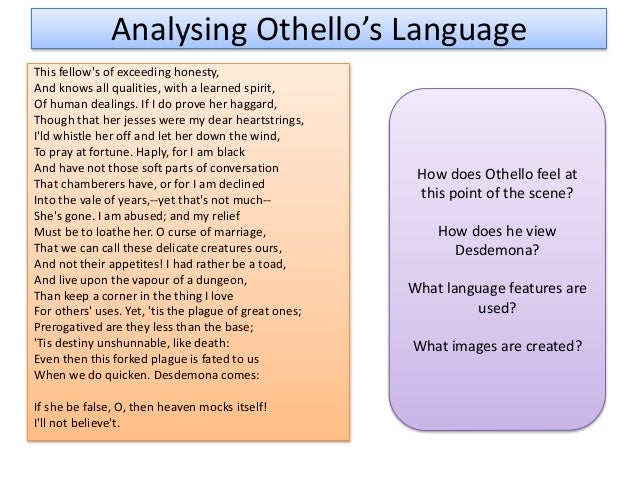

Summarizing we should say that Othello demonstrates the qualities that define a tragic hero: his downfall results from drastic changes in his behavior, he conveys a number of flaws characteristic to a tragic hero, he provokes a wide range of feelings with those who witness his tragedy. We are inclined to think that the dubious nature of the reader’s feelings is a direct consequence of the tragedy that the whole play brings about. Some have a feeling of disgust towards his actions others feel nothing but pity towards the tragic hero.


We cannot but speak about the emotions that Othello evokes with the readers. Because of his weak character Othello fails to resist Iago’s poison suggestions concerning Desdemona and falls victim to Iago’s traitorous nature.

The thing is that Iago makes use of Othello’s lack of self-awareness to provoke and intensify natural feelings of jealousy. We can also assume that this is not jealousy but Othello’s susceptible mind should be called his fatal flaw. After killing Desdemona he commits suicide which contributes to his status of a tragic hero: he takes responsibility for his actions in this way. Though Othello regrets the outcomes of his anger, it is too late already. The instances of Othello’s anger are numerous in the fourth and the fifth acts, this conduct of his contrasts sharply with his previous behavior. Actually, Othello’s anger is an outcome of his jealousy. Jealous emotions made Othello lose his mind and ability to make any reasonable judgments. Jealousy has never done any good to people and Othello’s tragedy is a good illustration of this fact. He never questions Iago’s suggestions concerning Desdemona, his gullibility results in his jealousy. Othello appears to be a very trustful person in terms of his intercourse with Iago. We are inclined to think that one of the most significant values of Shakespeare’s play is rooted in his message that jealousy ruins not only people’s relationships, but their lives as well. The most outrageous flaw of his is his jealousy. What also empowers us to call Othello a tragic hero is the tragic flaws that he has. He fails to resist the anger, or, to be more exact, he never even attempts to do it. Enraged and hurt, he is mistaken in his judgments about Desdemona, it is anger that he is moved by and not his sound mind. Othello’s anger appears beyond his control, and being moved by Iago’s subjective attitude towards Desdemona he kills her. His distrust is based on Iago’s assumptions about Desdemona he cannot control his anger any longer and does not stop in front of disrespect towards her in public. If at the beginning of the play he absolutely trusts his beloved Desdemona, as the play goes, he gradually loses his confidence in her. This character is not stable he is constantly developing throughout the play which leads to his overall tragedy. The plot involving the handkerchief points in at least a couple of directions, namely: what was once intimate–the sharing of a personal memento–is somehow debased by being shared with another and the item itself copied (1) and turned into a piece of evidence (2) in the service of an accusation.Webster’s New Millennium Dictionary suggests the following definition of a tragic hero: it is “a literary character who makes an error of judgment or has a fatal flaw that, combined with fate and external forces, brings on a tragedy” (Tragic Hero) We suppose that William Shakespeare’s character of Othello perfectly suits this definition.To What Degree Is This Play About Jealousy? What Does It have to tell us about Jealousy.
Othello as a tragic hero series#


 0 kommentar(er)
0 kommentar(er)
